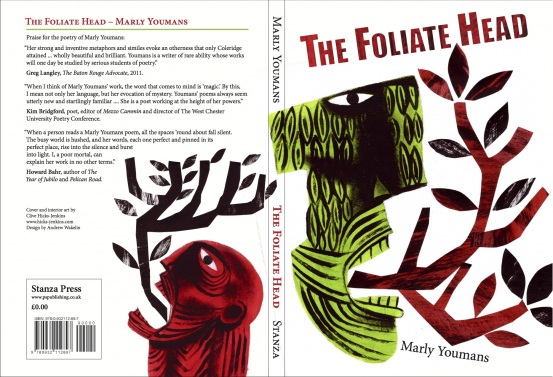 |
Jacket art, detail from Clive Hicks-Jenkins
Design by Mary-Frances Glover Burt |
April, national poetry month, 3
Here's a blank verse passage from the title poem of
The Throne of Psyche (Mercer, 2011.) We've had harpies and grief for April-the-cruelest-month in the first two selections; here is Eros bedding Psyche, love and the soul forcibly entwined.
Available in hardcover and paperback. Originally published in
Mezzo Cammin.
III. THE MARRIAGE BED
And if the palace seemed bewitching, how
Much more the bed, a marvel of the gods—
Like nothing for an earthly king and queen,
A lustrous treasure box packed up in silks,
Four-legged, each leg a tree of ebony.
As shadows slid across the windowsills,
Collecting in the corners of the room,
The trees began to send out wands and leaves,
Darkening the air with gleaming branches.
Whoever saw such freedom from the laws
Of earth? I stared, forgot to tremble in
My wonder as new tendrils wove a maze
Above a bed that glistened, beetle-black.
Unseen hands drew dusk across the portal
And windows, carried off the glowing lamp,
And strewed fresh petals on the inlaid floor.
If this was how my promised husband’s house
Received his bride, perhaps the feathered snake
—for so Apollo’s oracle foretold—
Could be more beautiful than I had dreamed,
If flying terror could be beautiful.
Shade took the room until I could not see.
A mimic springtime blossomed on each branch
As tiny stars shone out, began to crawl
And sometimes blink like phosphorescent bugs.
I fell asleep and shinned the olive tree
That waxed inside my mother’s garden walls
And heard a crinkling of the leaves that spoke
Oracular to me of love and fate,
But where was dream and where the waking world
I hardly knew, and when the feathered snake
Came wooing with eternal promises,
I let him hold me in his arms that seemed
More like a man’s than like a serpent’s grasp.
Yet fear is strange: at times he seemed all scales
That snagged against the linen of my gown,
At times he seemed as yielding as a child.
I woke to find that what I dreamed was true—
The rustle of his wings was like the leaves,
The arms that pinned me close were like a man’s,
Although no man could emanate such fire,
A darkness glowing in the chamber’s pitch.
But what did I, long sheltered in my home,
Know of the ways of monsters or of men?
A tree of nerves sprang into trembling life
Inside this body that the world desired
But never knew—the starry insects swarmed
Among the maze of limbs and multiplied
Until the dark was pricked with flecks of light
That gave no seeing to my open eyes.
The snake kept winding on the tree of me—
I flashed with nervous fire from root to leaf
And shivered as my gown was tugged aside.
A rush of wood: new saplings broke the floor
And forested the chamber, wild with growth.
The room dissolved as floor was changed to earth
And roof transformed to sky and swarming stars.
In midnight’s wilderness my lover struck
Asunder all my childhood’s innocence—
The little stars went shrieking through the wood
As jet-black trees contracted, splintered, fell.
I lay within a nest of shattered twigs.
A shape with wings was sobbing on my breast,
Some wall between us battered down to dust.
I touched the face invisible to me.
His serpent pinions beat convulsively.


















